The European Investment Bank (EIB) approves a €575 million loan to support a Repsol project. The project concerns the deployment of wind and solar farms in Spain, with a total capacity of 1.1 GW. These new renewable energy facilities should be operational before the end of 2025. The projects developed will generate enough electricity to power around 645,000 Spanish homes every year. They will reduce greenhouse gas emissions by more than 800,000 tonnes of CO2/year.
Supporting economic and social cohesion
Over 35% of installed capacity will be in cohesion regions. Per capita income is less than 75% of the European Union average. This underlines the EIB’s commitment to economic and social cohesion. The EIB today signed a 400 million euro financing agreement. This is the first tranche of an approved 575 million euro loan. This funding will help accelerate the energy transition. It will enhance security of electricity supply and promote climate action, as well as economic and social cohesion. This loan is part of the EIB’s specific contribution to REPowerEU. It will help boost energy security by reducing the EU’s dependence on imported fossil fuels.
A partnership for net zero emissions
Ricardo Mourinho Félix, EIB Vice-President, said at the signing ceremony in Madrid: “With this operation, the EIB continues to accelerate Spain’s energy transition by increasing renewable energy production capacity and supporting Repsol’s decarbonization strategy. This is a critical moment, accentuated by the impact of Russia’s unjustified aggression against Ukraine. Guaranteeing access to sustainable energy for all Europeans is essential for the EU’s strategic autonomy. Public-private partnerships and a strong corporate commitment to decarbonization are more necessary today than ever”.
Repsol CEO Josu Jon Imaz commented: “This new financing supports the company’s roadmap set out in the 2021-2025 Strategic Plan, which aims to achieve installed capacity of 6,000 MW by 2025 and 20,000 MW by 2030. The EIB’s support confirms our goal of net zero emissions by 2050 and testifies to our progress in the right direction”.
A renewed partnership to combat climate change
This is not the first time that the EIB has supported Repsol’s decarbonization strategy. Last December, the EIB had already granted a €120 million loan for the construction and operation of Spain’s first advanced biofuels production plant, located in Cartagena (Murcia region). Repsol already has a global portfolio of 1.9 GW of renewable energy projects in operation, the majority of which are in Spain.
In addition, the company holds renewable assets at various stages of development in the United States, Chile, Portugal and Italy. Repsol was the first company in its sector to commit to achieving zero net emissions by 2050, and is implementing an ambitious decarbonization strategy in line with the objectives set by the Paris Agreement and the United Nations Sustainable Development Goals. The company’s roadmap includes targets to reduce carbon intensity by 15% by 2025, 28% by 2030 and 55% by 2040.
The EIB’s commitment to energy transition
By 2022, the EIB Group has committed more than 17 billion euros in financing for the energy transition in Europe. Projects in Spain received a record 3.1 billion euros in funding commitments for sustainable energy and natural resource conservation projects in the same year, making it the second largest beneficiary in the EU. These figures confirm the European bank’s commitment to ensuring access to sustainable energy in these uncertain times. These investments are helping Europe to cope with the crisis caused by the sudden reduction in gas supplies following Russia’s unjustified attack on Ukraine.
In July 2023, the EIB’s Board of Directors decided to increase the additional funds earmarked for projects in line with REPowerEU, the plan to end Europe’s dependence on imported fossil fuels, to €45 billion, a 50% increase on the initial €30 billion package announced in October 2022.
Expansion of eligible sectors: a strategic investment towards carbon neutrality
The EIB’s Board of Directors has decided to broaden the scope of eligible sectors. This measure strengthens funding for European advanced manufacturing in strategic net-zero-emission technologies. It also covers the extraction, processing and recycling of critical raw materials. These additional funds will be deployed between now and 2027, and are expected to mobilize over €150 billion of investment in the targeted sectors.
The EIB and Repsol continue their partnership to combat climate change and accelerate the energy transition in Spain. This new investment will support Repsol’s ambitious decarbonization roadmap. It will help strengthen the EU’s energy security by reducing its dependence on imported fossil fuels. These actions are essential to achieving the objectives of the Paris Agreement and ensuring a sustainable future for Europe.






















